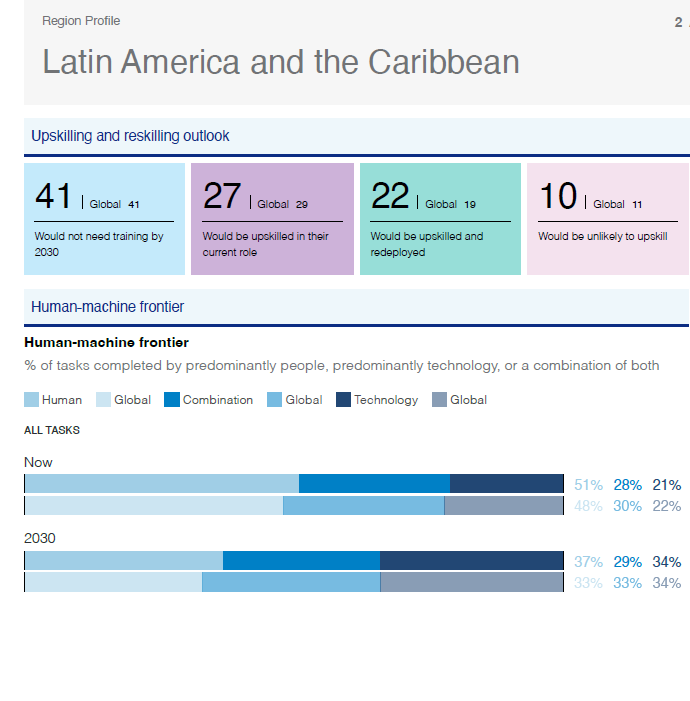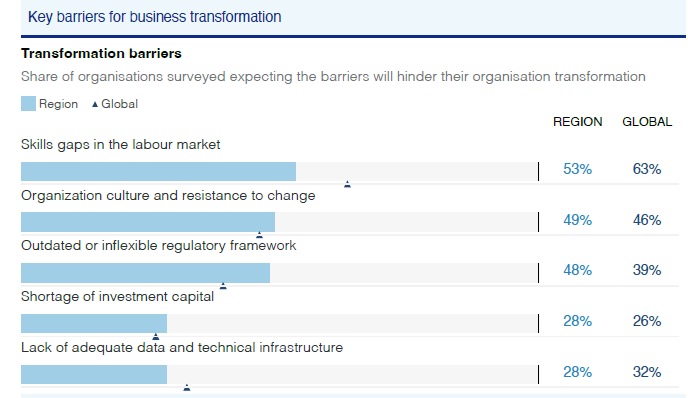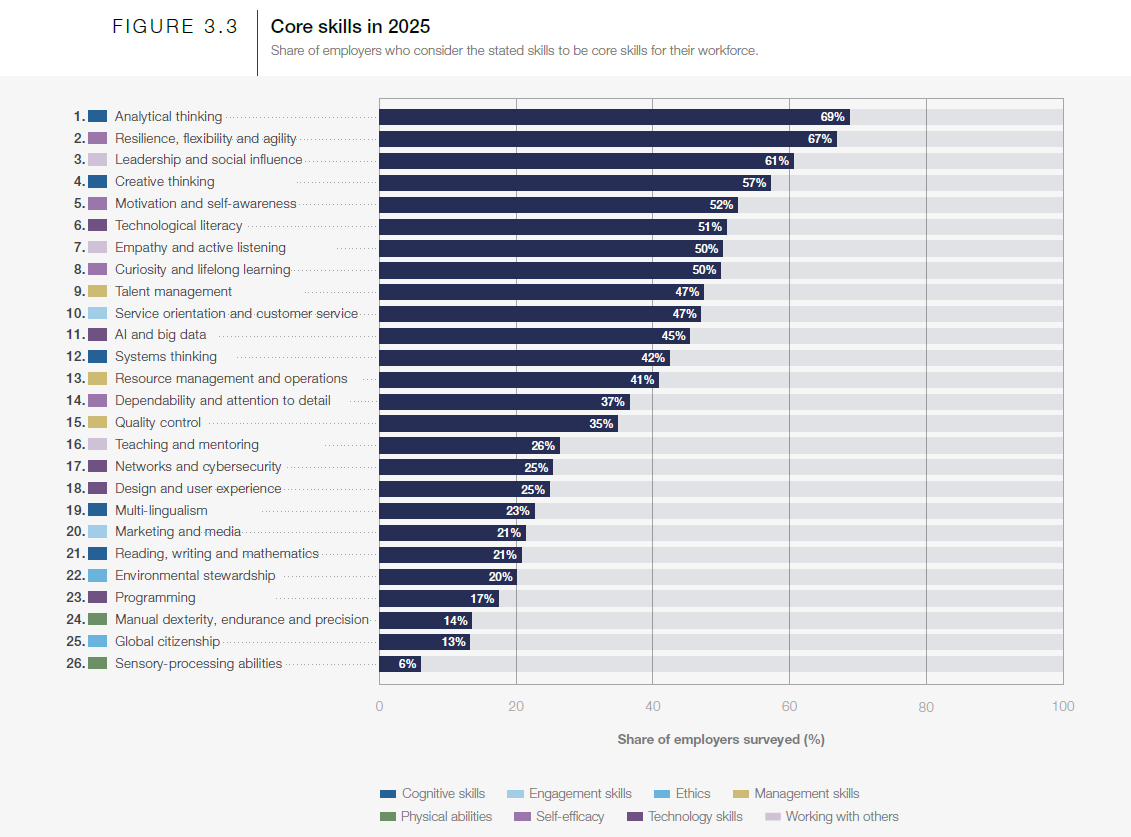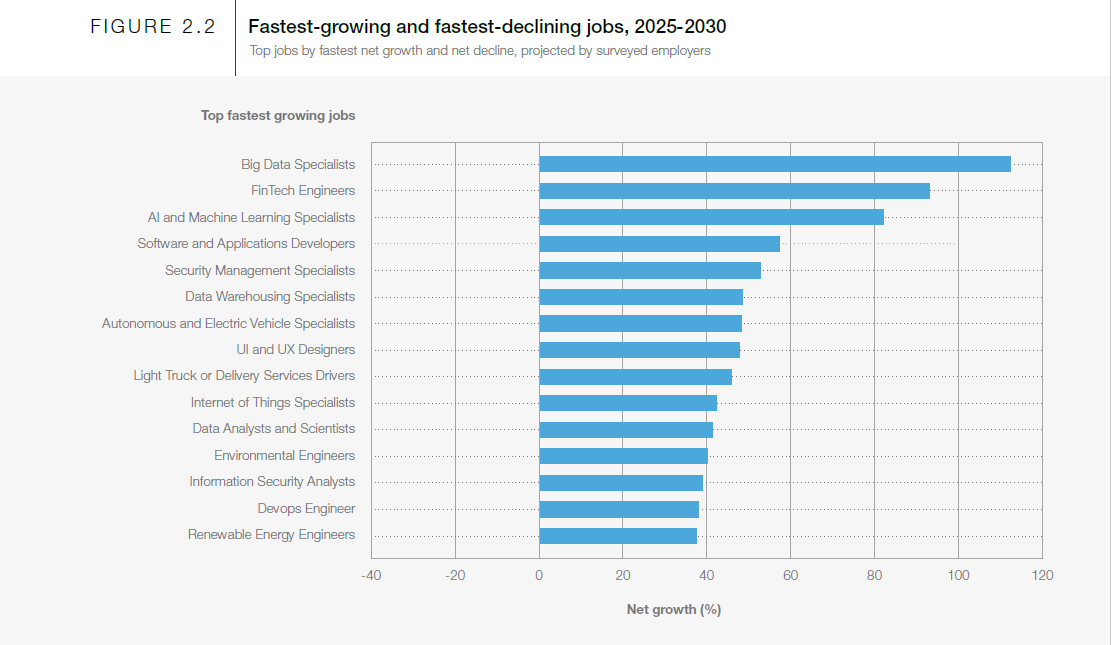The WEF Future of Jobs Report 2025
Insights from the latest The Future of Jobs Report - 2025 and some specific trends for the Latin America workspace.
Hi, this is Juliana, and welcome to a free issue of the Hiring in LatAm Newsletter. In every issue, I share insights and tips to simplify hiring in Brazil and other Latin American countries. Whether you're a foreign company expanding operations in the region or already established and are looking to navigate the nuances of building a stellar team, this newsletter has you covered.
To get issues like this every week, subscribe:
The Future of Jobs Report brings together the perspective of over 1,000 leading global employer, across 22 industry clusters and 55 economies from around the world, showing the workforce transformation strategies employers plan to embark, across the 2025 to 2030 timeframe. Here are some insights from this annual report.
1. Key barriers for business transformation in LatAm
Companies based in Latin America and the Caribbean expect increased digitalization, stronger focus on labour and social issues, and increased efforts towards climate mitigation to drive labour market change over the 2025-2030 period.
The main barriers to business transformation both in the region and globally are skills gaps in the labour market, organizational cultures, and outdated regulations.
Eighty percent of firms expect talent development to improve over the next five years, surpassing global averages. A large majority of employers in the region plans to respond to skills gap by upskilling their own workforce (84%), accelerating the automation of tasks (81%), or hiring staff with new skills (68%).
Key Drivers of Change:
Increased digitalization, focus on labor and social issues, and climate mitigation efforts.
Barriers to Transformation:
Skills gaps, outdated regulations, and resistant organizational cultures (each cited by 50% of respondents).
Talent Development:
80% of firms expect talent development to improve, surpassing global averages.
Responses to skills gaps include:
Upskilling the workforce (84%).
Accelerating task automation (81%).
Hiring staff with new skills (68%).
2. Country-Specific Insights
1. Argentina
Drivers of Change:
Broadening digital access, climate mitigation, and economic uncertainty.
Barriers:
Skills gaps (65%), outdated regulations (57%), and resistance to change (48%).
Responses to Skills Gaps:
Hiring staff with new skills (71%), automating tasks, and investing in reskilling/upskilling (below global average at 71% vs. 85%).
Job Growth:
Fastest-growing roles include Data Analysts, AI Specialists, and Machine Learning Specialists.
Compensation Strategies:
57% of employers plan to adjust salary strategies to support purchasing power (higher than 33% globally).
2. Brazil
Barriers:
Skills gaps are a primary barrier to business transformation.
Job Growth:
Roles in demand include Digital Transformation Specialists, AI and Machine Learning Experts, and Supply Chain Specialists.
Workforce Development:
89% of companies plan to upskill their workforce.
Skill Trends:
Fastest-growing skills: AI and big data, creative thinking, technological literacy.
Increased emphasis on empathy, active listening, resilience, flexibility, and lifelong learning (cited by 60%
3. Colombia
Drivers of Change:
Digital access, carbon emissions reduction, and labor/social issues as main drivers of change
Barriers:
Skills gaps (65%) and outdated regulations (61%) are a primary barrier
Talent Outlook:
47% expect talent availability to improve (higher than global averages).
Retention Strategies
Employee health, well-being, and career progression are the main retention strategy
4. Mexico
Automation and Robotics:
63% of companies plan to increase the use of robotics within five years.
82% aim to accelerate task automation over the same period.
Job Growth:
Fastest-growing roles include Information Security Analysts and Big Data Specialists.
Talent Retention:
53% of employers expect improvements in talent retention, surpassing the global average of 44%.
Key skills anticipated to grow:
AI and big data expertise.
Creative thinking.
Resilience, flexibility, and agility (73%).
Environmental stewardship (69%).
3. Core Skills in 2025 in the global workforce
While the core skill sets are relatively consistent across broader industries and geographical regions, there are notable distinctions within specific sectors and geographies.
The 10 top most demanding skills are: analytical thinking, resilience, flexibility and agility, leadership and social influence, creative thinking, motivation and self-awareness, technological literacy, empathy and active listening, curiosity and lifelong learning, talent management, and service orientation and customer service.
4. The Fastest-growing and fastest-declining jobs 2025-2030
5.Interesting articles and videos about society and culture:
This interesting article brings reflection about the capitalism and how modern culture mirrors the desperate aspects of sales, with individuals constantly "selling" in increasingly competitive and precarious environments.
The key to successful sales is making the audience feel something, whether awe, empathy, or discomfort. Sometimes charisma and confidence can establish dominance, even when credibility is questionable.
When I interview senior sales professionals, it’s easy to notice that, in most of the cases, those who are excellent at sales are often not the most trustworthy.
The Real Difference Between American and Chinese Values
There are some interesting videos from Andrew Bustamante, a former CIA intelligence officer. In this one he talks about the differences between Chinese and American culture. Americans think through a lens of capitalism and opportunity, equality, fairness and freedom. For Chinese, is about bringing honor to your family name, being the person who protects the honor that your parents and your grandparents have put in into protecting your family name and not being the one to ruin it.
Recommend Hiring in LAtAm to your readers.
The most relevant insights and updates about the Latin American workforce, designed for foreign companies looking to hire in the region.
Thanks for reading!
Juliana.
Leave a comment








